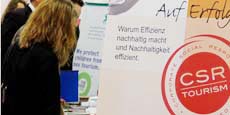'Learning sustainability' - Dagmar Lund-Durlacher gives keynote speech at CSR days
January 31, 2013
Prof. Dagmar Lund-Durlacher talked sustainability at the third annual Corporate Social Responsibility Days (CSR), organized in co-operation with Naturefriends International and ECPAT Austria.
The two-day event ‘’Time for Innovation – tipped for success with CSR’’ focused on CSR in tourism and modern strategies for successful businesses.
Opening the second day, Prof. Lund-Durlacher gave a keynote speech under the topic ‘Can sustainable tourism be learned?’ entitled ‘’Sustainability in Tourism Education – The holistic approach of Modul University Vienna. Using MU as a case example, she explained the university’s view of sustainability as a key principle, and how it is integrated within the curriculum.
She proposed a number of ideas on how sustainable tourism can indeed ‘be learned’:
1. Sustainability issues should be incorporated throughout all modules, at all levels, with linkages between modules. Offering dedicated sustainability modules treats sustainability as something which is done. However, an integrated approach where sustainability elements can be incorporated in all program modules and courses treats sustainability as a way of doing things. Content wise, the triple bottom line of sustainability - economic, environmental and socio-cultural and their inter-relationships - all need to be addressed when considering sustainability issues. Sustainability is not anti-business and must permeate all classical management subjects, not as an add-on theme but as an underlying philosophy. MU follows this integrative approach in integrating sustainability into the curriculum.
2. Sustainability needs to be strategically located at the university, school, or department level in order to ensure that the principles of sustainability are really embedded in teaching and learning. All academic and administrative levels have to be a committed to sustainable development and education for sustainable development, and program directors need to consider strategically where and how sustainability will be incorporated within their program(s) and beyond the programs.
3. It is necessary to engage the whole system in which the educational programs are based and through which they operate. This holistic approach means that Education for Sustainable Development ESD is not only a matter to be implemented in the curricula or educational programs but also in institutions and organizations which facilitate these learning processes. It means that educational institutions and teachers are leading by Example. To teach sustainability, institutions need to look at their own practices in the context of sustainability (e.g. waste management, energy conservation and water use, transportation, respect for social, economic and cultural diversity, etc.), as these unconsciously inform teaching and learning.
4. It is more important to shift the pedagogical approaches than to embed core sustainable development content in the curriculum.
5. New teaching approaches should be used, which not only create a knowledge base but which also enable social learning toward a sustainable tourism future.
6. Active and participatory learning are commonly recognized as central to teaching and learning strategies for sustainable development because they encourage learners to ask critical reflective questions, clarify values, envision more positive futures, think systemically, respond through applied learning, and explore the dialectic between tradition and innovation.
7. Modelling good practice: Learning is also taking place implicitly through the hidden curriculum. How many educators seek to reduce paper use and turn off lights out at the end of sessions? These are means of teaching students the importance of action-taking. It is important to introduce means to motivate educators to adopt a sustainable behaviour, because they act as role models.





